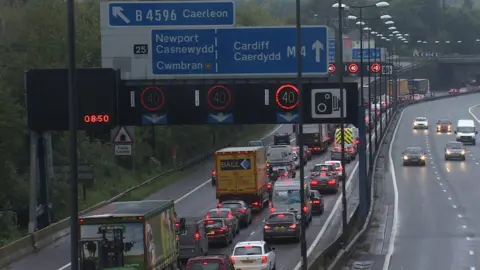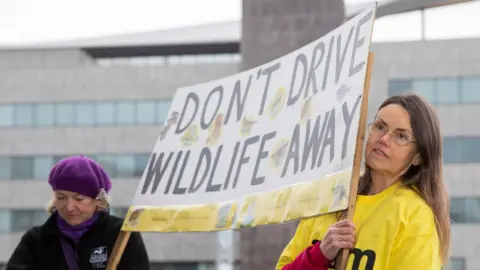M4 congestion: Spend £800m on public transport, report says
 BBC
BBC£800m should be invested in public transport to help ease traffic jams on the M4, a report has recommended.
A commission was set up after Welsh ministers scrapped plans to build a £1.6bn relief road around Newport.
To encourage people out of their cars, its report suggested considering a "workplace parking levy" and ensuring public transport was "affordable for all".
The panel was told not to consider plans for another motorway.
The South East Wales Transport Commission recommended tripling the number of train stations between Cardiff and the River Severn, from three to nine, as well as establishing bus and cycle route networks in Newport.
If all the recommendations were acted on, it suggested more than 90% of people in Cardiff and Newport would live "within one mile of a rail station or rapid bus corridor".
The report recommended better integration and coordination of rail and bus networks and integrated tickets across all services. Services should run every 15 minutes and stations should be more accessible on foot and for cyclists.
Currently, common M4 journeys are poorly served by public transport alternatives, it said, with Newport served particularly poorly by rail.
It said "flexible office hubs" should be established in major towns and cities, in order to support remote working.
Although most M4 journeys cannot be substituted by walking or cycling because of their distance, the report said active travel had "a key role".
The commission suggested making walking or cycling the "natural choice" for the first and last mile of public transport journeys and recommend establishing "a major cycleway" linking Cardiff and Newport.
Although travel habits have changed due to Covid-19, the report said those changes "do not fundamentally alter" the need for more transport options and claimed the pandemic provided "an opportunity to prepare significant transport improvements while demand is reduced".
A 20% reduction in flow on the M4 would have a significant positive impact on journey times, it said.
The commission, chaired by Lord Burns, described its recommendations as "ambitious yet achievable".
It said its "fast track" recommendations - made in a progress update in December 2019 - were "consistent" with their final recommendations.
This included the introduction of a 50mph average speed control and more lane guidance on the westbound approach to the Brynglas tunnels in Newport.
The report said the cost of the recommendations would be between £600m and £800m:
- The majority of the cost would be in developing the rail network on the south Wales main line - costing between £390m and £540m
- Developments on the line would include new stations on Newport Road in Cardiff and a new Cardiff Parkway station in St Mellons, plans for which have already been developed by a private company
- In Newport, the report suggested creating a Newport West station near Tredegar Park, and a Newport East station in Somerton, as well as stations at Llanwern and Magor
- A bike hire scheme, similar to Nextbike in Cardiff, should be established in Newport too
At peak times, between 3,000 and 5,000 vehicles approach the Brynglas tunnels every hour.
Alleviating congestion on the M4 by moving commuters and travellers on to public transport would benefit goods and services traffic which are less able to switch to other modes of transport, according to the report.
 Getty Images
Getty ImagesFirst Minister Mark Drakeford scrapped plans to build a £1.6bn relief road last year after declaring a climate emergency because of its environmental impact, as well as the effect on the public purse.
Welsh Secretary Simon Hart said in October the UK government had not ruled out bypassing the Welsh Government to build to road.
The commission said in principle it was in favour of road charging, but was not recommending this due to the absence of a UK-wide scheme, but said it should be considered again in future.
The UK government said it continued to believe that a relief road remained the "most viable solution to the ongoing congestion problems" around Newport.
A spokesman added: "The report is welcome and highlights the undoubted necessity for improvements in south Wales' transport infrastructure.
"The need to make improvements for people using the road and rail network is why the UK government launched its Union Connectivity Review last month."
